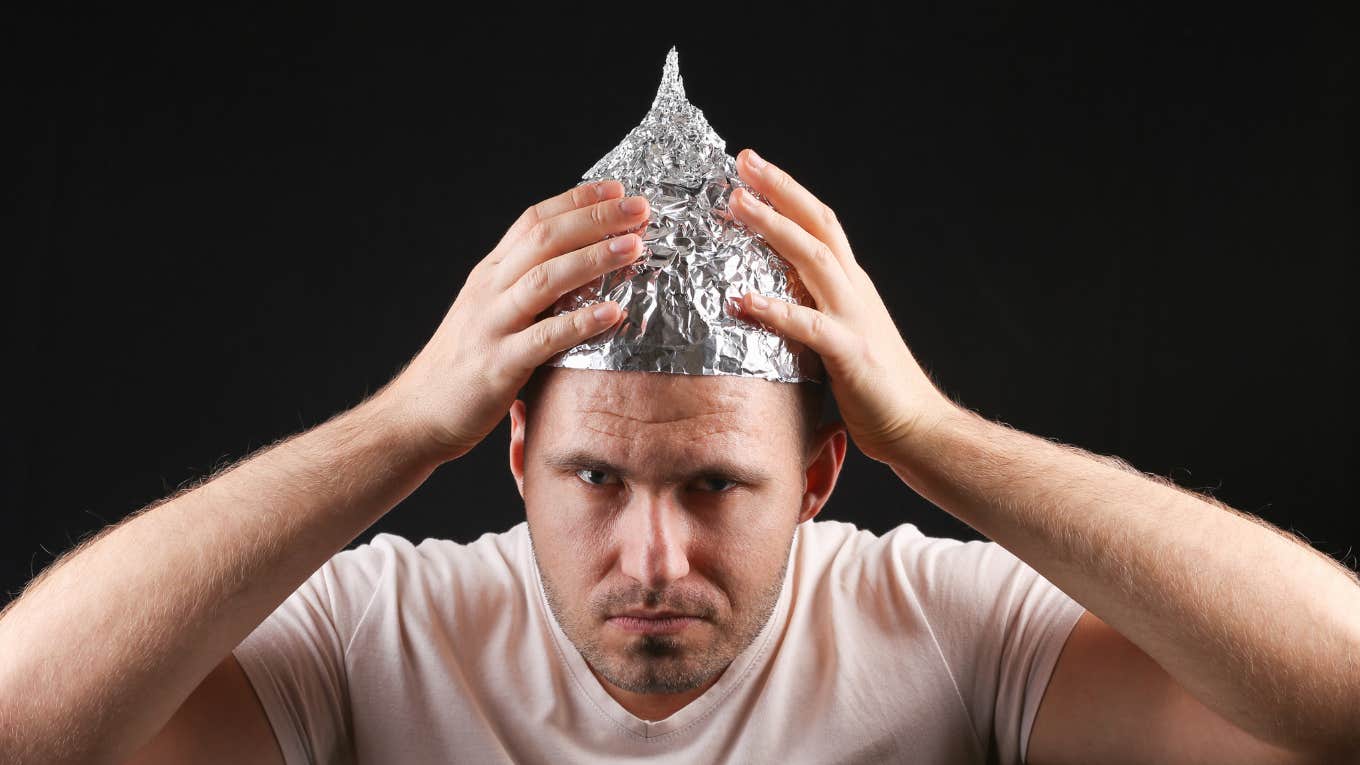People Who Wholeheartedly Believe In Conspiracy Theories Usually Have These 5 Reasons, According To Psychology
They're not just gullible. There are deep psychological reasons involved.
 vladimirsukhachev | Canva Pro
vladimirsukhachev | Canva Pro Conspiracy theories have been with us for ages, and they seem to be becoming more absurd as time goes on. But how and why do people end up falling for these absurd ideas, and why is it so hard to talk them out of them? It's a complicated question, but psychology has shed some light on the mystery.
And if you're one of the gazillions of people with a loved one who's been dragged down one of these bizarre rabbit holes, you know how hard it is to understand, and even harder it is to reason with them. Knowing the types of experiences and traits that make people wholeheartedly believe in conspiracy theories can at least shed some light on how to fight them.
1. Childhood trauma
 behrouz sasani | Unsplash
behrouz sasani | Unsplash
A 2024 study found that people who had adverse childhood experiences or were raised in an unusually stressful environment were more susceptible to conspiracy theories.
They found that for individuals who grew up this way, latching onto conspiracy theories is an evolutionary response to chaos, both in childhood and in the present. The theories provide an order to things, even if a false one, and also scapegoat a malevolent villain or a cabal of supposed wrongdoers for disturbing chaos, which resonates for those with experience being victimized.
2. Chronic unmet psychological needs for control and belonging
Speaking of chaos, we have been living in chaotic circumstances for arguably decades now (has anything REALLY ever gone back to normal since the Great Recession, or 9/11 for that matter, let alone 2020?). And our basic needs are harder to come by, from our economic essentials to the relational ones we're missing due to the "loneliness epidemic." Scientists say this is the perfect breeding ground for conspiracy theories.
A four-year study found that those who felt a lack of control or sense of belonging were not only far more likely to report holding conspiracy theory beliefs, but that when one of those needs declines, the depth of belief in nonsense increases.
In a cruel twist, the conspiracy theories provide a simulacrum of these unmet needs to the believer, providing a sense of camaraderie and community with their fellow believers, and a sense of purpose from supposedly uncovering "hidden truths." It's like a self-reinforcing feedback loop.
3. Chronic sleep deprivation
 Ani Kolleshi | Unsplash
Ani Kolleshi | Unsplash
Sleep impacts every aspect of our lives and mental health, and when it comes to the negative impacts, it exacerbates them. This includes susceptibility to conspiracy theories, it turns out, because a lack of sleep exacerbates everything from anxiety and depression to cognitive bias and emotional stress.
One study, for example, showed subjects two different reports about the 2019 fire at Notre Dame Cathedral, one that was factual and one that suggested a purposeful fire and a cover-up. They found that sleep-deprived subjects were significantly more likely to believe the conspiratorial story than others.
4. Lack of intellectual humility and superiority complex
Intellectual humility is the psychological term for basically being open-minded and admitting you don't know everything, something, you may have noticed, all too many of us lack. This, along with a feeling of being superior to others, was found in a study to have a direct correlation with conspiratorial thinking.
When you're closed-minded to the idea that you might be wrong about things, you're not only susceptible to wild ideas but deeply averse to listening to reason, as any of us with conspiracy-pickled relatives and friends know all too well.
Throw in the idea that you and people like you are better than others, whether it's because you believe the "truth" unlike all the other "sheeple," or because you think you're of a superior race or genetic make-up, and you have an even bigger problem.
5. Fear of perceived threats, danger, and uncertainty.
Especially these days, conspiracy theories are often based around perceived dangers that are often debunked, non-existent, or vastly overblown. Take a five-minute dip into any "mommy" group on Facebook and you'll see a prime example of this: the myriad moms convinced there are human traffickers lurking in every Target parking lot waiting to steal their "babies."
Never mind that there is no evidence this is happening besides hearsay, and that the overwhelming majority of human trafficking involves long-term coercion by someone the victim knows, not snatching them out of a shopping cart at Walmart. These moms will not be disabused of this notion, and people working on the actual issue have repeatedly decried how these conspiracy theories have diverted resources away from the actual problem.
Accordingly, fear of threats and danger was found in a study to be among the strongest predictors of falling for conspiracy theories. Fear is a powerful motivator to believe pretty much anything. All you need to do is look at our current political landscape to see that we're drowning in the proof of this particular concept.
John Sundholm is a writer, editor, and video personality with 20 years of experience in media and entertainment. He covers culture, mental health, and human interest topics.

